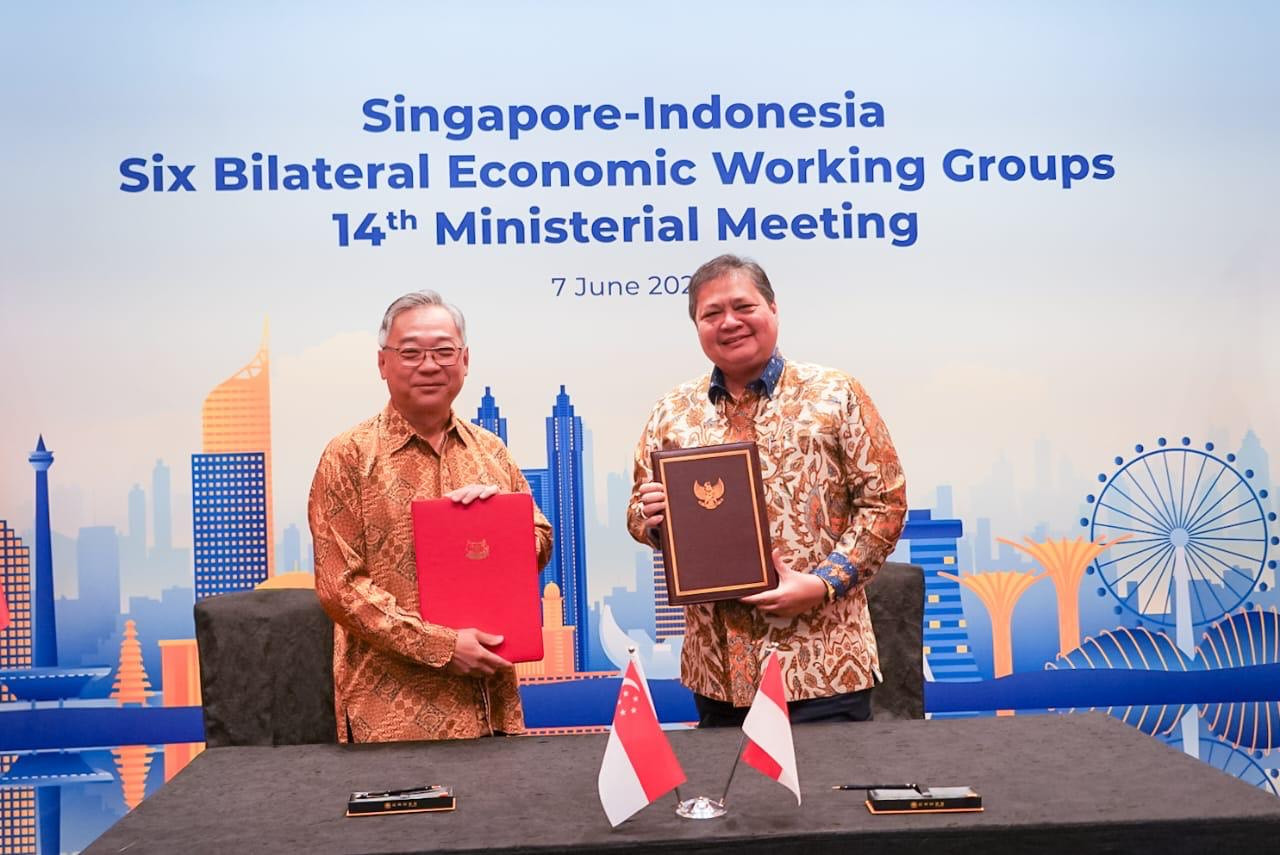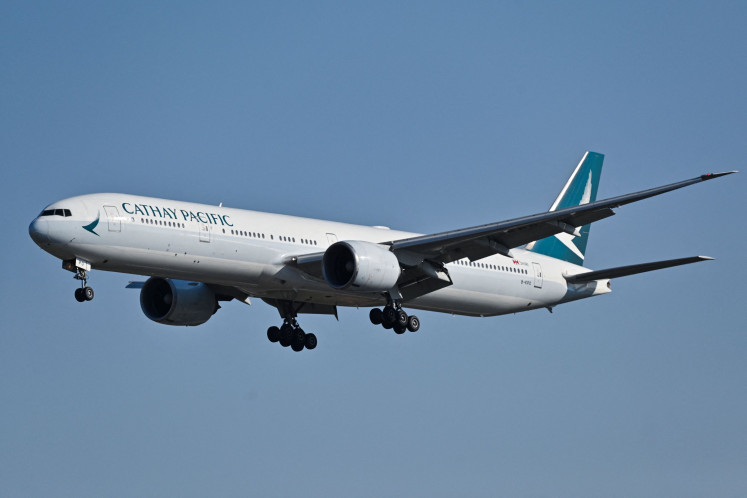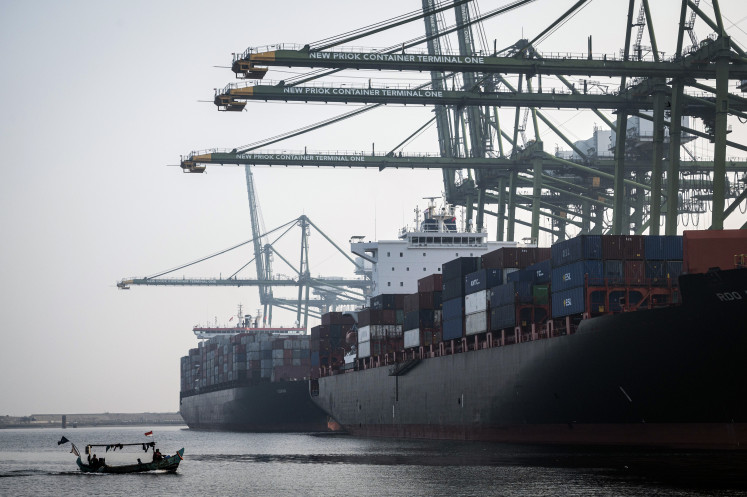Popular Reads
Top Results
Can't find what you're looking for?
View all search resultsPopular Reads
Top Results
Can't find what you're looking for?
View all search resultsIndonesia, Singapore fortify economic ties at 16th 6WG MM
Change text size
Gift Premium Articles
to Anyone
I
ndonesia’s potential to become a major player among the world’s biggest economies has become apparent in recent years, with the government also implementing various incentives to encourage foreign direct investment for economic growth and prosperity.
To make even greater achievements, bilateral cooperation must be fostered and strengthened.
Airlangga Hartarto, the Coordinating Minister for Economic Affairs, together with Singapore’s Deputy Prime Minister Gan Kim Yong, kicked off the Indonesia-Singapore Six Bilateral Economic Working Groups Ministerial Meeting (6WG MM) on June 7 at the Marina Bay Sands hotel in Singapore.
"I would like to thank you for your hospitality and the excellent organization of the IPEF meeting, including this bilateral meeting,” said Coordinating Minister Airlangga on Friday, referring to the Indo-Pacific Economic Framework for Prosperity.
“I would also like to formally congratulate you on your appointment as Deputy Prime Minister, in addition to continuing your position as Minister of Trade and Industry," he continued, addressing Gan directly.
Deputy Prime Minister Gan returned the sentiment, expressing his hope that the close relationship between Singapore and Indonesia would continue to develop amid the current challenges, while opening up various new opportunities to mutually increase economic growth.
The occasion marked the 16th iteration of the annual event, which is part of the two countries’ bilateral economic cooperation framework, following the 15th edition in August 2023 held in Semarang, Central Java.
The agenda for this year’s 6WG MM aims to increase economic cooperation between Singapore and Indonesia, including with the Batam, Bintan, Karimun free trade zones (BBK FTZs) and other special economic zones (SEZs). The meeting is vital to boost investment and cooperation across the transportation, agribusiness and tourism sectors, as well as in the workforce.
The senior minister also expressed his hope that Indonesia would join the ranks of the world’s 10 largest economies in the next decade. To achieve this, Indonesia needed to achieve economic growth of between 6 and 7 percent, with investment being one of the main drivers, through better support and collaboration with Singapore.
"Indonesia will also continue to strive to maintain stability and peace in the Indo-Pacific region as well as in the ASEAN region. I am sure that Indonesia, together with Singapore, can be an anchor," said Airlangga.
Airlangga also shared recent developments in Indonesia's accession process to become the first ASEAN member in the Organisation for Economic Co-operation and Development (OECD) as well as to gain membership in the Comprehensive and Progressive Agreement for Trans-Pacific Partnership (CPTPP). He conveyed his belief that support from Singapore would play an enormous role in both processes.
In noting some of the significant progress the 6WG had made to date, Airlangga mentioned ongoing investment in the Data Center at Nongsa Digital Park in Batam, the Riau Islands. He added that the facility was also being used as a training and education center for local digital talent.
To ease investment in Indonesia, the coordinating minister apprised the meeting attendees of the multiple-entry D17 Visa available for Singaporean experts who made routine trips to Indonesia, as well as an interministerial-interinstitutional coordinated notification scheme for the arrival of foreign experts to the BBK FTZs.
Airlangga also introduced Kendal Industrial Park (KIP), which had seen its value skyrocket since its designation as Indonesia’s newest SEZ, resulting in a far-reaching multiplier effect. This exponential growth was directly related to the financial incentives provided in the SEZ in the form of tax facilities, such as tax holidays and tax allowances.
The KIP currently has 100 businesses and an investment value of Rp 43.8 trillion (US$2.7 billion).
"We really appreciate the process that is currently underway, because the process is a journey in itself. The Six Bilateral Economic Working Groups have also made very significant progress, and I thank the teams of both countries who have worked hard to achieve that," Airlangga said.
The meeting concluded with Airlangga and Gao signing of the Joint Report to Leaders, regarding the achievements and developments of the Six Bilateral Economic Working Groups, for submitting to the heads of state of Indonesia and Singapore.
Among the dignitaries attending the Indonesia-Singapore 6WG MM were the Indonesian Ambassador to Singapore Suryopratomo as well as several key officials from the Office of the Coordinating Minister for Economic Affairs, including Secretary to the Coordinating Minister for Economic Affairs Susiwijono Moegiarso, Special Staffer for Accelerated Regional Development, Infrastructure Development and Investment Wahyu Utomo, Deputy Director of Asian Economic Cooperation Bobby C. Siagian and Communications, Information and Conference Services Bureau head Haryo Limanseto.
This article was published in collaboration with Coordinating Ministry for Economic Affairs Republic of Indonesia.










